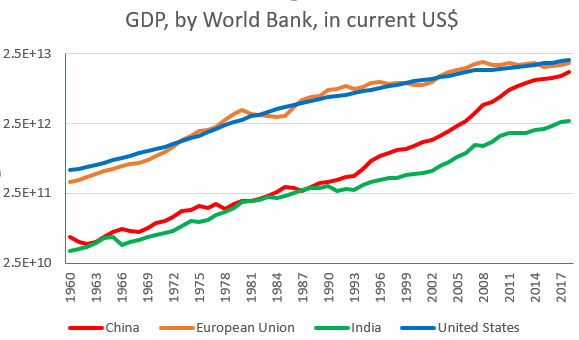In 2015, Prof. Kishore Mahbubani of the National University of Singapore gave a very provocative speech at the Harvard University’s Institute of Politics.
The view points expressed in this speech are very different from those we hear in the press, from politicians or pundits in the United States. They are different from expressed opinions in the US from the left or the right. They are different from expressed opinions in the US from the intelligentsia or from the general populace. The speech is a breath of fresh air. Unfortunately, it did not stir up a thing in the still air that is the political discourse of the United States.
In this speech, he discussed three issues:
- What are China’s goals and aspirations as it tries to emerge and rise?
- How does the relationship between the US and China influence the rise of China?
- How China behaves as #1 will be strongly influenced by how America behaves as #1.
I’m afraid I can’t quite take the first question very seriously. After all, how can a country have goals and aspirations? If by that he meant those of its leaders, wouldn’t that suffer changes when its leadership changes? To wit, see how the US positions on everything changed when president Trump came to office, or every once in a while while he is in office.
So I’d remove that point, and add one from the Q&A section, to make up another three. And let me skip the questions and jump to the conclusions:
- The rise of China from number two economy to number one economy is a probable event in the foreseeable future.
- It is in the best interests of the United States and rest of the world to maintain and enhance the international institutions.
- China has no intention of exporting its own ideology or government system.

OK. This issue #3 is very much in the same vein as the original #1. It talks about intention. Which is illusive. But beyond making up a triple, I also happen to have a couple of points to make. But let me discuss these items in turn.
First, how probable is the rise of China to #1 in the world, and in what time frame? According to Prof. Mahbubani, it should happen just about now (since his talk was given about 5 years ago), or maybe 5 years from now. But taking the World Bank’s numbers, and project forward rather pessimistically, we get that China’s economy should surpass that of the US by 2040, if China’s grows at a compound annual rate of 4%, and that of the US grows at 2%. This projected date changes to 2033 if the two rates are changed to 6% and 3% respectively.
But that’s just numerical projection. Chinese official policy has vacillated between promoting or suppressing private enterprises. What does that matter? To me, a private enterprise, especially one with competition, has to chase profit. Therefore, its investments are in areas it anticipates to have real demand. Unless there is fraud. One former CEO of my company (in its former self) is still being wanted for committing fraud. The fraud he’s accused of is to sell products to nobody, in order to create the illusion of profits, especially predictable profit growth. On the other hand, a government-owned enterprise can exist without a profit motive. And it can fraud at a bigger scale. And can do it with impunity. That’s why the GDP figures from China are somewhat fluffy. And the marginal rate of return for new investments is quite low. I’m not saying that I can give a projection of China’s GDP, or its growth. I can’t.
On the second point (according to my summary), I can readily agree with Prof. Mahbubani. In international affairs the US has been behaving quite irrationally, and sometimes capriciously, and it’s not good for the US or the world at large. I actually think that there is a grave mistake in the way the country’s government is setup. While there is plenty of check-and-balance in the arena of domestic policy, there is none, legally, in international policy.
On the third point, there is actually historical evidence pointing to China actively export its ideology to other countries, particularly southeast Asia and Latin America. This was mostly before the Cultural Revolution. Hopefully it has changed.
But the biggest problem I have with Prof. Mahbubani’s speech is his benevolent assumption that all economical growths and forms are good. History is not as kind. For example, German GDP grew significantly under Hitler. You may point out, and rightfully so, that he was the appointed leader in a democracy, and it I’d agree. But he did dismantle the democratic institutions and became a dictator. Now I’m not saying that the current condition in China is comparable to that of Germany before and during WWII. But someone in China is seemingly afraid of such a comparison. The example I have is that when I wrote a blog entry entitled Auschwitz, it cannot be transmitted via the Chinese social media app WeChat, unless I avoid using that word in the title. The content of the blog entry had nothing to do with current politics, or China. But the word in the title is too sensitive.
So what am I saying about Prof. Mahbubani’s speech? I like it being different from everything one regularly hears in the US media. I agree with some of his observations, especially about the US government’s hypocrisies. But I do not agree with some of his assumptions, or conclusions. It’s complicated.